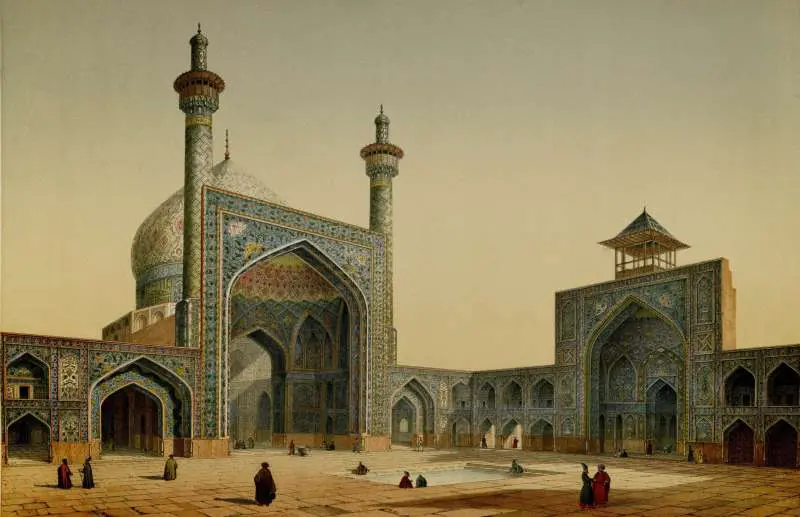Originally posted at the Ezra Institute for Contemporary Christianity website.
Recently Wheaton College, an evangelical institution, placed one of their faculty members on administrative leave after the professor had worn a hijab “during the period of advent before Christmas as a sign of solidarity with Muslims,” in which she taught “[Christians & Muslims] worship the same God.”[1] The decision has since sparked debate[2] over both the suspension, as well as the question of worship and the nature of God.[3] The fourth Islamic successor of the Ahmadis Messiah, Mirza Tahir Ahmad (1928-2003), wrote in his book Islam’s Response to Contemporary Issues that the issue of mankind’s salvation is greater than any one religion:
It is one thing for a religion to declare that those who seek to be redeemed from Satan and attain salvation should rush to the safe haven of that religion; it is there that they would find salvation and eternal liberation from sin. But it is quite another thing for the same religion to declare in the next breath that those who do not come hither to seek refuge will be doomed eternally, one and all.[4]
In other words, salvation is available to all men and women in all religions, but to claim that one faith carries the only path to salvation is unacceptable. The Ahmadis, although similar in their beliefs to the larger Islamic community, differ in their understanding of salvation, prophethood and messiahship, amongst other things. However, this concept of multiple paths leading to God has recently been entertained by an Islamic scholar in the West, speculating that there may be other avenues to salvation outside of Islam.[5]
This is a reflection of our pluralistic culture, promoting for the validity of all religions equally. But Ahmad does not appear to be very tolerant of Christianity’s claim of exclusivity. He writes that Christians who believe in the exclusivity of their faith, no matter what “they do to please God, however much they love their Creator and His creation, however much they lead a life of purity and piety, they would most certainly be condemned to an everlasting fire.”[6] Christianity is spun out to be just another man-made religion seeking to monopolize salvation.
But how does he know? This claim to know that all paths lead to God, that all ways provide redemption from sin and salvation, requires justification. It is much like the mountain analogy, in which each climber takes a different path to reach the precipice of the mountain.[7] The Buddhist takes a path from the north believing it will reach the top, the Hindu takes a path from the south believing it will also reach the top, the Muslim takes a path from the east, and the Christian takes the path from the west.
From their perspectives, it is impossible to know if all paths lead to the top. Such assurance can only come from one who has a view from the top of the mountain, who can see all the paths from start to finish. The only way the climbers can know whether their path leads to the top is if it is revealed to them by the one above the mountain. And that is the case with the Christian; his knowledge that faith in Christ is the only road to God is not based on his finite perspective, but rather on the revelation of God as communicated in His word, the one high above the mountain.
Attempting to validate all religions across the board prompts various conflicts. How can we know what is truth? By which religion’s morals and values do we abide? Which religion’s principles should be used as our guide for building a good society? Which religion’s definition of salvation is the right one? Such an understanding of reality is incomprehensible, violating the law of non-contradiction, which states that two or more contradictory statements cannot be true at the same time and in the same sense.[8]
The result, ironically, is that man is deified, determining for himself good and evil, deciding for himself what his reality should be. Ours is not the first society to fall for this line (Gen. 3:5). Man is his own god in the making, and the world is nothing more than his clay. Sin therefore, the violation of God’s moral law, goes unpunished; and liberty is not freedom from sin but freedom to sin. How then does Ahmad expect to determine who is eternally damned and who is not? Islam doesn’t provide the solution; according to the Qur’an, Allah is a judge who manipulates the scales of justice, increasing the weight of good deeds over the bad (Q. 4:40; 6:160). This is no different from other religions, where works are fundamentally perceived as the method of attaining salvation.
Thankfully, we don’t live in a world of uncertainty, void of truth. We received the revelation of God, and the truth of His gospel. We have a clear understanding of what truth, justice, life, and redemption are in Christ these things are unsustainable by other worldviews. In response to Ahmad’s claim, what distinguishes the Christian faith from all other faiths is that salvation is not based on our good works or merit, but rather on the grace of God. As we find in Titus 3:5, “[Christ] saved us, not because of our works done by us in righteousness, but according to his own mercy, by the washing of regeneration and renewal of the Holy Spirit” (ESV).
Man would like nothing more than to orchestrate his own redemption, but we find in Scripture that our good deeds apart from Christ are dirty rags (Isa. 64:6). Jesus taught “I am the way, the truth, and the life. No one comes to the Father except through Me” (John 14:6, NKJV). God revealed unto man the truth of reality, He exposes us for who we really are, human beings created in His image, lost in sin, and in need of a saviour. The apostle John wrote that “If we confess our sins, he is faithful and just to forgive us our sins and to cleanse us from all unrighteousness” (1 John 1:9, ESV). We cannot deny the exclusivity of the Christian faith. And it is not truth just because we say it is, but because the only One who can attest to its truthfulness is God who revealed His word and gospel to us. As St. Augustine writes, “The mysteries and secrets of the kingdom of God first seek for believing men, that they may make them understanding. For faith is understanding’s step, and understanding is faith’s attainment.”[9]
But this evangel, Greek for the “good tidings” of the gospel, is far more than personal salvation, it’s more than just a form of hell-fire insurance, it is a complete renewal in Christ, applicable to all areas of life. The gospel is the good news of His kingdom, that Christ reigns and rules upon His throne, that He has brought freedom to the captives (Lk. 4:18), delivered us from sin and the power of evil (Gal. 1:4) so that we may joyfully fulfill the will of God. Former bishop of Rochester Michael Nazir-Ali, himself of Muslim heritage, writes in his book The Unique and Universal Christ:
If Christ is Lord at all, he must be Lord of all… Through Christ’s reconciling work on the cross, not only have we the possibility of being friends with God, sons and daughters brought back into the household, but the curse on the world brought about by our rebellion can also be lifted (Rom. 8:18-25). The new life bursting forth from the empty tomb is a foretaste of the transformation that God wills for the whole of the created order.[10]
As we reflect on God’s forgiveness and grace, we find our pleasure in Christ, testifying of His faithfulness and truth. Salvation, redemption, and renewal can only be found in Christ, who is sovereign over all, outside of whom there is no solution to the human condition. “For where there is forgiveness of sins, there is not only ‘salvation’ but life, real life as spouses, parents, children, teachers, students, farmers, politicians – and all the relationships in life…”[11] Christ is the way, the truth and the life.
[1] Jade Walker, “College Moves to Fire Professor Who Said Muslims and Christians Worship Same God,” Huffington Post (The Huffington Post, January 6, 2016), accessed January 18, 2016, http://www.huffingtonpost.com/entry/wheaton-college-christianity-islam_568cffdfe4b0a2b6fb6de759.
[2] Samuel Smith, “800 Wheaton College Grads Threaten to Stop Financial Support If “Same God” Prof. Isn’t Reinstated,” Christian Post (Christian Post, January 18, 2016), last modified January 18, 2016, accessed January 18, 2016, http://www.christianpost.com/news/wheaton-college-800-alumni-threaten-stop-financial-support-larycia-hawkins-same-god-professor-not-reinstated-155247/.
[3] Lydia McGrew, “The “Same God” Debate Is Too Important to Leave to Philosophers,” The Gospel Coalition (TGC – The Gospel Coalition, January 15, 2016), last modified January 15, 2016, accessed January 18, 2016, http://www.thegospelcoalition.org/article/the-same-god-debate-is-too-important-to-leave-to-philosophers.
[4] Mirza Tahir Ahmad, Islam’s Response to Contemporary Issues (Tilford, Surrey: Islam International Publications Ltd., 2007), 20.
[5] NIM, “What Does the Good Society Look like? – Andy Bannister, Shabir Ally, Justin Trottier,” YouTube (YouTube, November 5, 2015), accessed November 10, 2015, https://www.youtube.com/watch?v=X0knmNLSRKw.
[6] Ahmad, Islam’s Response to Contemporary Issues, 20.
[7] Joseph Boot, “Babylon Strikes Back: The Syncretistic Motive of Modern Culture,” Jubilee, Summer 2015, 12.
[8] Paula Gottlieb, “Aristotle on Non-Contradiction,” Stanford Encyclopedia of Philosophy, last modified February 2, 2007, accessed November 10, 2015, http://plato.stanford.edu/entries/aristotle-noncontradiction/.
[9] Jill Haak Adels, ed., The Wisdom of the Saints: An Anthology (New York: Oxford University Press, 1987), 49.
[10] Michael Nazir-Ali, The Unique and Universal Christ: Jesus in a Plural World (Colorado Springs, CO.: Paternoster, 2008), 60.
[11] Steven D. Paulson, “The Forgiveness of Sins: Remissionem Peccatorum,” in Exploring & Proclaiming the Apostles’ Creed, ed. Roger E. Van Harn (Grand Rapids: William B. Eerdmans, 2004), 253.







